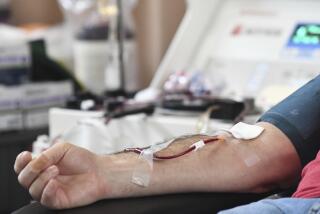Officials to Again Urge AIDS Tests for All Immigrants
- Share via
WASHINGTON — Federal health officials, quietly reversing themselves on the controversial question of mandatory AIDS antibody screening of immigrants, will again propose that all permanent immigrants to the United States be tested for exposure to the AIDS virus, The Times has learned.
“We believe this is necessary because any person infected . . . is assumed to be capable of transmitting the virus,” reads a Department of Health and Human Services memorandum accompanying the proposed rule, copies of which were obtained by The Times.
The proposal, which has been approved by Assistant Secretary for Health Robert E. Windom, awaits action by Secretary Otis R. Bowen and the White House Office of Management and Budget.
The test determines whether an individual has been exposed to the virus that causes AIDS, not whether he or she will contract the disease. However, an individual who tests positive is presumed to be infected and infectious to others.
The new proposal reflects an evolution during the last year in the thinking of federal health officials, who believe that those who are infected with the virus represent as great a danger of spreading AIDS as those who show symptoms of the disease, according to knowledgeable sources.
“The thinking now is that it is irrelevant whether you can recognize someone with clinical symptoms of AIDS,” one source said. “If you’re concerned with introducing new cases into the country, you have to be just as concerned with those who have asymptomatic infection as those who have symptomatic AIDS.”
Controversial Issue
The issue of AIDS and immigrants has been touchy and controversial since early 1986, as federal officials have wrestled with what action, if any, to take.
The proposal to test all immigrants originally was initiated by Bowen in January, 1986, shortly after he took office. At the time, it was vigorously opposed by the federal Public Health Service and the State Department, where officials argued that such a rule would encourage other countries to retaliate against the United States, which has the largest number of reported AIDS cases in the world.
“It is felt there that we are going to be the butt of ridicule abroad,” one source said. “The United States is still the single largest exporter of AIDS in the world, and we’re telling people we’re going to screen them ?”
The regulation was then revised to eliminate the testing requirement and simply add AIDS to the list of seven conditions--five of them sexually transmitted diseases--that exclude immigrants from entering the United States as permanent residents. This meant that only those with clinical symptoms of the disease would be denied entry.
No final action was ever taken on the proposal, which sources said the State Department continues to oppose.
Would Be Tested Abroad
The latest version of the regulation would require prospective immigrants to undergo the AIDS antibody procedure and confirmatory tests abroad before a visa for the United States is issued. Currently, immigrants may be screened for two other diseases on the list--infectious syphilis and active tuberculosis--at U.S. ports of entry because both conditions are treatable.
“However, since (AIDS) infection will not be waiverable for permanent admission to the United States, and because (it) is not treatable, to allow screening and exclusion from the U.S. after arrival at a U.S. port of entry would create great hardship on those aliens found to be positive,” the memo says.
Although acknowledging complications, the memo said that “disapproval (of the regulation) would likely open the department (of Health and Human Services) to criticism for failing . . . to recognize that persons with infection without (clinical symptoms of) AIDS are also capable of transmitting the disease.”
In addition, it said: “We anticipate objections to this proposed rule by some who may consider it discriminatory and an unnecessary measure to take for the protection of the public health.”
Economic Burden
On the other hand, the memo added: “Others may not oppose exclusion because of the potential of preventing the transmission of the infection, as well as reducing the economic burden in the United States due to the medical costs associated with AIDS.”
The memo said that health and human services officials again “anticipate objections from the Department of State because of concerns about retaliatory actions against U.S. citizens by other countries.”
The memo stressed that the decision to add AIDS infection to the list of excludable conditions “is not being made on the basis of any new scientific knowledge about the transmission of (AIDS) infection or the natural history of AIDS, nor should any such interpretation be drawn.”
Further, it said: “This designation does not alter existing infection or AIDS prevention and control activities in this country. All existing Public Health Service recommendations and guidelines on the prevention and control of infection and AIDS remain in full effect as currently written.”
An estimated 500,000 to 600,000 persons immigrate annually to the United States, including 200,000 temporary foreign residents who apply each year for permanent status, according to the Immigration and Naturalization Service. The order would not apply to tourists or visitors.
Also, the memo said: “This proposed rule will not interfere with the ability of an alien with AIDS who wishes medical care in the U.S. to seek a non-immigrant (temporary) visa . . . .”
Affects Immune System
AIDS, or acquired immune deficiency syndrome, destroys the body’s immune system, leaving it powerless against certain cancers and otherwise rare infections. The virus can also invade the central nervous system, causing severe neurological disorders. It is commonly transmitted through anal and vaginal sexual intercourse, through the sharing of unsterilized hypodermic needles and by woman to fetus during pregnancy.
In this country, AIDS has primarily afflicted homosexual and bisexual men, intravenous drug users and their sexual partners. As of Monday, 35,518 Americans had contracted AIDS, of whom 20,557 had died.
More to Read
Sign up for Essential California
The most important California stories and recommendations in your inbox every morning.
You may occasionally receive promotional content from the Los Angeles Times.










